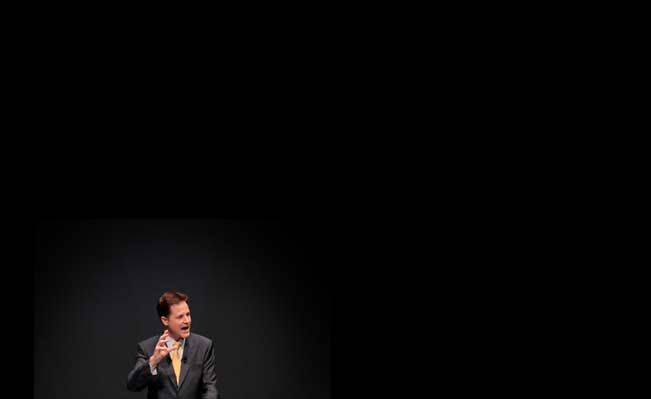
Nick Clegg and his fellow Orange Book neoliberals have merely restored the Liberal Democrats to their true place in British politics after a brief sojourn on the centre-left writes Alastair Stephens
For the Liberal Democrats small may be the new normal.
Not a single poll has put them on more than 10% for a good while now. They are heading for their worst result since 1970 when they took 7% of the vote and only won six seats.
They will win more seats than that this time, and will not have returned (at this election anyway) to the fringe party status they had in the 50s and 60s, but they will be a much diminished force.
Cleggmania can finally be written up in the history books as just a flash in the pan.
Friend or foe?
The fact is that our First Past The Post electoral system, rather than being the greatest enemy of the Liberal Democrats, has instead been their greatest friend.
FPTP has meant that they have been consistently under-represented in parliament and thus excluded from government.
This exclusion has meant that they have become a haven for discontented voters from the major parties on either side of them. But they never tried these voters loyalty by going into government with either of them. To do so risked alienating the voters more sympathetic to the other.
They could position themselves as they liked without ever having to take responsibility in government.
It is this that explains why amongst Europe’s centerist liberal parties, they almost alone could claim a quarter of the vote.
Facing left
The party’s last big growth spurt (the one that Clegg came in at the end of) was under Charles Kennedy who portrayed the party as being on the centre left, and who frequently tried to outflank Blair from this direction, not a difficult task it must be said.
He had correctly identified that there was an anti-Tory majority in the country created by Thatcherism and the Tories’ relentless pursuit of her agenda ever since.
It must also be remembered that the Liberal Democrats were created by a merger between the old Liberal Party and the Social Democratic Party, a split from the Labour.
It was generally thought that the left-right split amongst Lib-Dem voters was not 50/50 but 2/1 in favour of Labour.
This has turned out to be more or less right. The Lib-Dems are predicted to get around 8% in the general election. They took 23% of the vote in 2010, which means that they will have lost two-thirds of their vote since then.
Bosses’ B-team
Across western Europe, where most countries have two big parties, a social democratic party facing a conservative party, the liberal party in between tends to get under 10% of the vote (not 15 – 25 as in Britain).
These parties’ preferred partners in government have usually been to their right. This should not surprise us. Liberalism emerged as the ideology of business and commerce against landed interests and the church (whether the Protestant state church as in much of northern Europe or the Catholic Church in the south of the continent).
Liberal parties have nearly always favoured Free Trade and markets and in general opposed state intervention and regulation.
And that was where the Liberals in this country have stood, “the bosses’ B team”. Indeed they were the seminal liberal party and for the latter half of the 19th century they were the dominant party in British politics. Here as elsewhere though they were then squeezed by the emergence of workers’ parties and ruling class response, which was to consolidate around one party, usually conservative and Christian.
Restorationists
Nick Clegg and his fellow Orange Book neoliberals (of which Vince Cable is also one) have merely restored the party to its true place in British politics after its brief sojourn on the centre-left.
They will have also restored it to its appropriate share of the vote.
Which is small.

